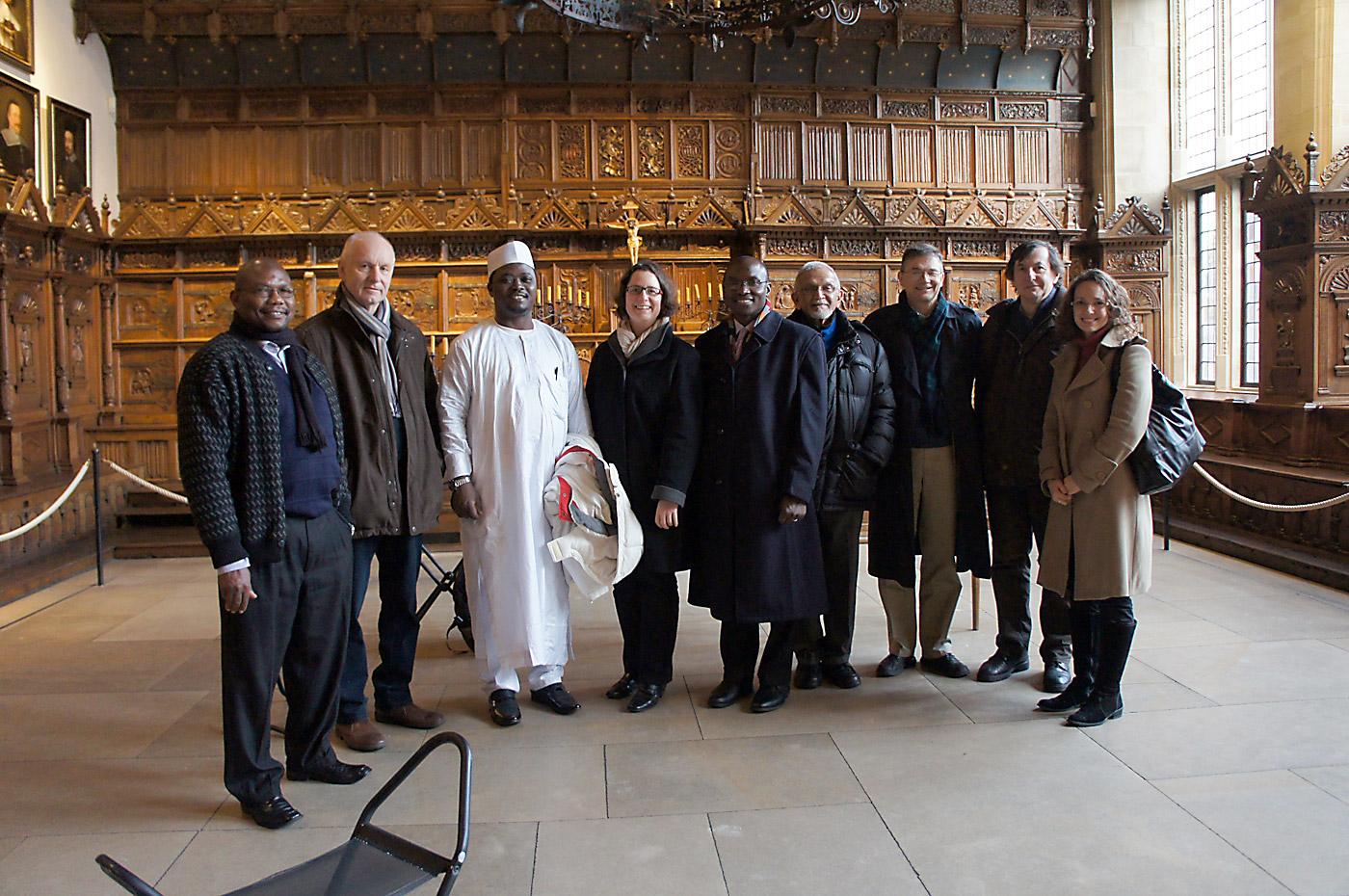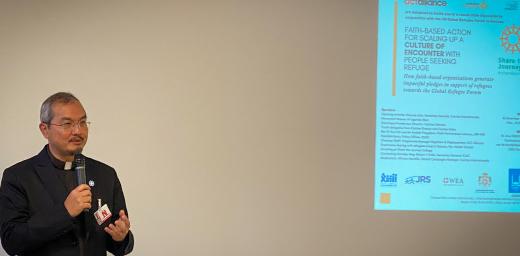Religions in the Public Space: A Contested Terrain

Participants of the Christian-Muslim consultation on public space in the âPeace Hallâ in Münster, Germany, where the Peace of Westphalia treaties were signed after the Thirty Years War in Europe. Photo: Marion von Hagen
Christian and Muslim Scholars Strive for a Definition of Secularity
(LWI) – Churches and mosques are just one way for religion to occupy space, says Rev. Dr Mitri Raheb from Bethlehem, Palestine, as he describes an everyday experience: “If I go into public transportation, most of the time, the driver has the Qur’an recitation on.” . In the same way that big Christian processions block the streets on Fridays, the Qur’an recitations on the bus are part of life in Bethlehem. Raheb continues, “A Muslim secular person has to endure that unless he has enough guts to tell the bus driver: Can you please turn it off. As a Christian, I have to endure it, unless I say something about it.”
Marking the Territory
The Middle East is not the only place where public space is a contested area, marked by religious hegemonies and polarized perceptions. At the international Christian-Muslim consultation “Creating Public Space.:The Role of Faith in the Public Sphere,” held from 9 to 12 January in Münster, Germany, 35 scholars from 15 countries and Muslim and Christian backgrounds critically analyzed the situation in their respective countries. They expressed common concern on how the majority religious group in a region usually dominates public space. The consultation was organized by the LWF Department for Theology and Public Witness together with the Center for Islamic Theology (ZIT) in Münster, Germany.
Vibrant expressions of religiosity in public transportation, shopping malls, streets and schools can be used by religious groups to mark the territory. Regions with undefined religious majorities may witness a struggle for attention in public space as Prof. Mohammed Ali Bakari, a political scientist from the University of Dar es Salaam in Tanzania, mentioned.
In many countries, debates about the constitutional framework for state and religious life in society have become an issue. “The 2012 constitutional amendments in Norway imply that the Evangelical Lutheran religion is no more referred to as the public religion of the state,” said Prof. Oddbjørn Leirvik from Norway.
“Instead, unspecified Christianity, on par with humanism, is referred to as a national heritage and as society’s value basis. I think the tendency is clear, namely, to translate God and religious traditions into general notions of heritage, values and nationhood.” In Norway, as well as Hungary, Christianity has found a way of retaining its symbolic hegemony, Leirvik explained.
Understanding Secularity
During the consultation in Münster it became evident that it is such hegemonic ambitions, not religion itself, which are making life difficult in religiously plural societies Stimulating debates emerged on the notion “secular” and the meaning of “secularity.”
In Islamic perspective, a secular state is essential to the teachings, as Prof. Adnane Mokrani, a Muslim from Tunisia currently teaching at the Pontifical Gregorian University in Rome argued: “The secular state is not a non-religious or anti-religious state, but rather a neutral one which treats all citizens equally. Forced faith is nothing but hypocrisy, a phenomenon condemned repeatedly and severely in the Qur’an.”
In some contexts, however, it is hard to make sense of secularity as a neutral space open and mindful of different religious backgrounds. Rev. Lesmore Gibson Ezekiel and Dr Imran Abdulrahman from Jos, Nigeria, described tensions and conflicts in the country and said that most people in Nigeria would resent the notion of “secular space” as it would be perceived as having anti-religious implications.
Protecting the Vulnerable
Leirvik suggested moving the discourse from group solidarity to protection of the vulnerable, thus creating space for equal citizenship. Strengthening interreligious dialogue by providing opportunities to enhance mutual trust is much needed in plural societies, he said.
Rev. Dr Leonard Mtaita, General Secretary of the Christian Council of Churches in Tanzania, reported efforts in building constructive interreligious relations in the face of extremist religious violence, while Jonas Widmer from the Institute for Peace Church Theology at the University of Hamburg, Germany, described how Mennonite communities have committed themselves to be peacemakers in society.
Muslim and Christian scholars affirmed that both religious traditions need to revisit their holy scriptures and explore the guiding principles that affirm human dignity and life. Dr Clare Amos, interreligious program executive at the World Council of Churches, underlined: “One of the key principles is the affirming of life, it is an underwriting hermeneutical principle through the spectacles of which we need to read the Bible.”
“Secularity does not mean to abandon God or to abandon religion,” Prof. Abdulaziz Sachedina from George Mason University in the United States concluded: “It simply means to create all the possibilities within our power not to impose our doctrines on others, and yet be able to live in respect with empathy so that we can work together for the betterment of the entire citizenry”.





